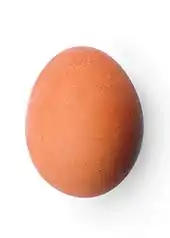ovo
Esperanto
Etymology
From Latin ōvum (“egg”), from Proto-Indo-European *h₂ōwyóm (“egg”).
Pronunciation
- IPA(key): [ˈovo]
- Audio:
(file) - Rhymes: -ovo
- Hyphenation: o‧vo
Galician
Etymology
From Old Galician-Portuguese ovo (“egg”), from Latin ōvum (“egg”).
Pronunciation
- IPA(key): [ˈɔ.βʊ]
Noun
ovo m (plural ovos)
References
- “ovo” in Dicionario de Dicionarios do galego medieval, SLI - ILGA 2006–2022.
- “ovo” in Xavier Varela Barreiro & Xavier Gómez Guinovart: Corpus Xelmírez - Corpus lingüístico da Galicia medieval. SLI / Grupo TALG / ILG, 2006–2018.
- “ovo” in Dicionario de Dicionarios da lingua galega, SLI - ILGA 2006–2013.
- “ovo” in Tesouro informatizado da lingua galega. Santiago: ILG.
- “ovo” in Álvarez, Rosario (coord.): Tesouro do léxico patrimonial galego e portugués, Santiago de Compostela: Instituto da Lingua Galega.
Ido
Etymology
Borrowed from Esperanto ovo, French œuf, Italian uovo, Spanish huevo, from Latin ōvum (“egg”), from Proto-Indo-European *h₂ōwyóm (“egg”).
Pronunciation
- IPA(key): /ˈo.vo/
Latin
Etymology 1
Onomatopoeic; compare Ancient Greek εὐάζω (euázō).
Pronunciation
- (Classical) IPA(key): /ˈo.u̯oː/, [ˈou̯oː]
- (Ecclesiastical) IPA(key): /ˈo.vo/, [ˈɔːvo]
Usage notes
In Classical Latin, the verb is mainly found as a present participle, ovāns.[1] The perfect stem ovāv- is attested only post-Classically.
Conjugation
Etymology 2
From ōvum (“egg”).
Pronunciation
- (Classical) IPA(key): /ˈoː.u̯oː/, [ˈoːu̯oː]
- (Ecclesiastical) IPA(key): /ˈo.vo/, [ˈɔːvo]
References
- “ovo”, in Charlton T. Lewis and Charles Short (1879) A Latin Dictionary, Oxford: Clarendon Press
- “ovo”, in Charlton T. Lewis (1891) An Elementary Latin Dictionary, New York: Harper & Brothers
- ovo in Gaffiot, Félix (1934) Dictionnaire illustré latin-français, Hachette
- Carl Meißner; Henry William Auden (1894) Latin Phrase-Book, London: Macmillan and Co.
- (ambiguous) from beginning to end: ab ovo usque ad mala (proverb.)
- (ambiguous) from beginning to end: ab ovo usque ad mala (proverb.)
- “ouō” on page 1278 of the Oxford Latin Dictionary (1st ed., 1968–82)
Mountain Koiari
References
- Roger and Susan Garland. Mountain Koiali - English Dictionary. Ukarumpa: SIL, Ms. 38pp. (1983).
Norwegian Bokmål
Etymology
From Latin ōvō, dative/ablative singular of ōvum (“egg”), from Proto-Italic *ōwom (“egg”), from Proto-Indo-European *h₂ōwyóm (“egg”), likely from *h₂éwis (“bird”), possibly from *h₂ew- (“to enjoy, consume”).
Pronunciation
- IPA(key): /ˈoːʋɔ/
Audio (file) - Rhymes: -oːʋɔ
- Hyphenation: ov‧o
Related terms
- -ovo
Portuguese

Etymology
From Old Galician-Portuguese ovo (“egg”), from Latin ōvum (“egg”), from Proto-Italic *ōwom, from Proto-Indo-European *h₂ōwyóm (“egg”), likely a derivative of *h₂éwis (“bird”). Doublet of ova.
Pronunciation
- IPA(key): /ˈo.vu/
- Hyphenation: o‧vo
Related terms
Serbo-Croatian
Pronunciation
- IPA(key): /ǒʋoː/
Spanish
Pronunciation
- IPA(key): /ˈobo/ [ˈo.β̞o]
- Rhymes: -obo
- Syllabification: o‧vo
Further reading
- “ovo”, in Diccionario de la lengua española, Vigésima tercera edición, Real Academia Española, 2014